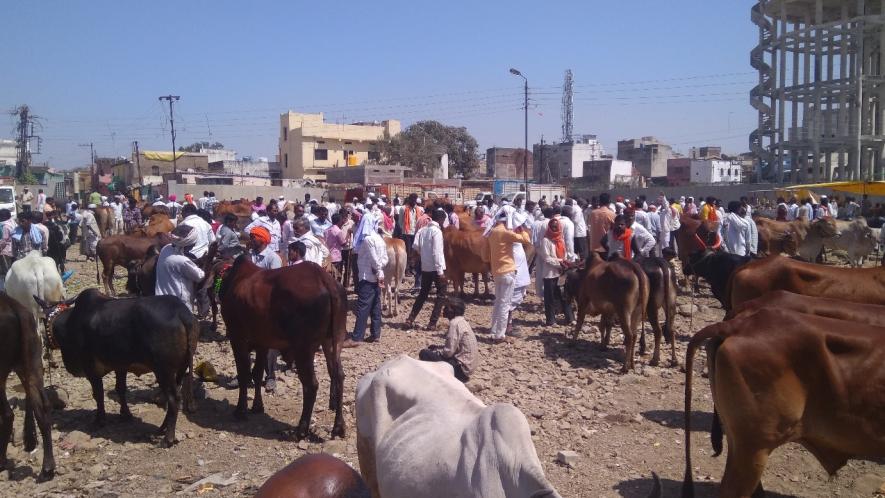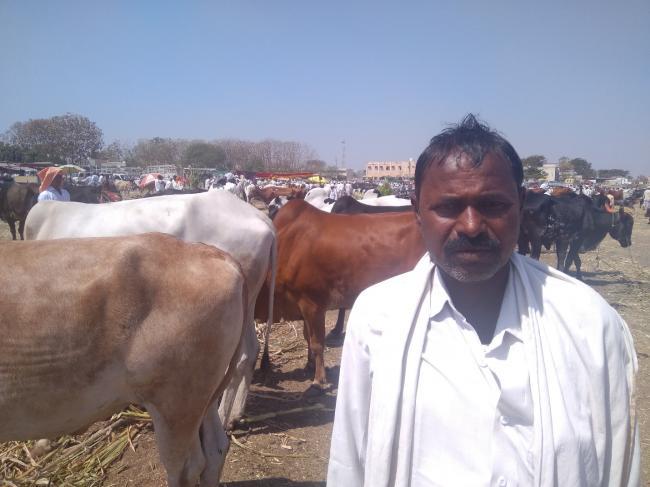#MahaDrought: Cattle Ban Ideologically Motivated, Harmful for Rural Economy, Say Farmers

Hingoli Market, Picture courtesy: Amey Tirodkar
[Maharashtra is facing one of the most severe droughts since 1972, with the state government declaring drought in 180 tehsils out of 350. Entire Marathwada (spread across Southern and Eastern Maharashtra) region is in dire condition now. This is part 10 of the series of ground reports by Newsclick.]
Sahebrao Bangar is a 63 years old trader of animals from Hingoli district of Marathwada. This reporter met him on the day of weekly bazaar of animals in Hingoli. “See, how much time I do have to talk to you. Had you come around three years back on the bazaar day, I wouldn’t have spoken a word to you. Par kya kare? Dhande ko mitti ki bhi kimmat nahi rahi (What can we do? We’re getting peanuts in this business),” he said.
He has been in this business for past 25 years. Bangar used to sell seven to eight animals in this bazaar. “This is the bazaar of the district. That kind of business would take place here. Now, I don’t even bring five animals to the market. Rent of the tempo [for the animals] is higher than what I earn here in the bazaar,” said Bangar.
Anywhere we go in Maharashtra, the story remains the same. This has been attributed to the widely discussed and criticised Maharashtra Animal Preservation Act of 2015. This Act, that implemented the infamous beef ban in the state, is one of the major reasons for farmers’ tensions as well as slowdown of the rural economy.
As the drought plagues a large part of Maharashtra, in addition to the issues like scarcity of drinking water and debt, the farmers are worried about how to keep their cattle alive. Newsclick had earlier reported on how the farmers were selling the animals at giveaway price for the lack of fodder camps.
Shambhuraje Nimbalkar of Ieet village in Osmanabad had two cows, and he sold both of them. “I could have earned Rs 1 lakh 40 thousand at the usual market rates. But cattle market is already down, and additionally, there is drought now. I got just Rs 60,000,” he said. Gahinath Jagdale, 78, from Hivra village of Osmanabad, told Newsclick that he sold his three cows to survive. “We don’t have water to drink. Then how will I be able to keep those cows? They need fodder and water.” In such a dire condition, the selling of cattle would have helped farmers in many ways. However, govansh hatya bandi (cattle slaughter ban) has become a major hurdle before them.
“See, now farmers are being slammed from both the sides. First, we are not getting adequate financial assistance from the government. So, this selling of cattle would have given us some financial relief. But government has brought in this Act, and farmers are failing to get a good price for their animals,” said Panditrao Hode, a farmer from Vasmat tehsil of Hingoli district.
Also read: #MahaDrought: Loan Waiver Will Not Help in the Time of Drought
What is more shattering for the traders as well as farmers is the carpet ban. “See, we are traders. But let me tell you. Nobody used to sell their cows for beef. What was being sold for beef was bullocks, bulls and buffalos. Cows were sold for milk always. The government should have thought about the carpet ban before bringing this law,” said Ashok Gavhane, a trader from Barshi, Solapur, who had come to the Nilanga cattle market of Latur district.
As everyone is aware, the motive behind bringing this act was purely ideological. It is not hidden that the subtle agenda behind this is purely anti-Muslim. Although there is no data to support this claim, it is widely believed that a large part of Muslim community works in the beef industry. However, there are Hindu traders too in Maharashtra, and the ruling party should understand that the business and economy don’t differentiate between Hindus and Muslims.
Taufiq Bepari and Balaji Tarange, both of whom had come to the Nilanga market, have been in this business for last 15-20 years. “If we buy one bull for Rs 60,000, we need to take it to a number of markets. If that bull doesn’t get sold, then we keep it in our possession. Per animal, the water, fodder expenditure is around Rs 3,000-4,000 per month. So, the cost of the bull increases accordingly. There is the additional cost of taking them to the market and bringing them back as well. So, overall, the cost goes up to Rs 70,000 in just one and a half month. If we fail in recovering that Rs 70,000, what should we do?” asks Taufiq.

Balaji Tarange, Picture courtesy: Amey Tirodkar
“Earlier, companies from Hyderabad and Mumbai used to reach out to the rural markets for the bulls and buffalos. It was obviously for beef. Now, as that market is closed, we are failing to do business here,” said Tarange.
In such a condition, farmers were looking up to the government they had elected. But the government has clearly failed in coming to the rescue of the farmers. “Aikayachech nahiye tar karayache kay? Tumhich Sanga, (If the government won’t listen to us at all, what do we do?),” questioned a farmer.
Also read: #MahaDrought: Negligible Returns From the PM’s Insurance Scheme For Farmers
Get the latest reports & analysis with people's perspective on Protests, movements & deep analytical videos, discussions of the current affairs in your Telegram app. Subscribe to NewsClick's Telegram channel & get Real-Time updates on stories, as they get published on our website.
























